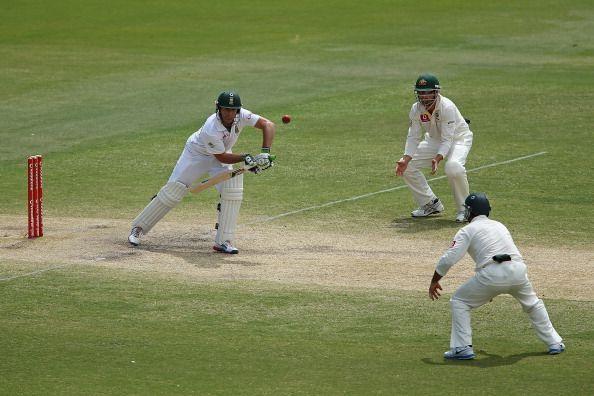
In the longest and purest form of cricket, the strike rate is not giving much importance. Strike rate is considered as an irrelevant factor to judge batsmen’s capabilities to score runs in Test cricket. Test cricket is all about survival, A batsman is given the freedom to bat as long as he can and score crucial runs for the team. However, in modern-day cricket, some batsmen try to do aggressive batting in Test cricket but most of them unable to generate big scores.
A tough draw in Test cricket is equally important as a victory. Batting for long hours and scoring big runs is a skill, however, defending against aggressive pacers and saving the team from losing the match is a skill that not many possess. In the history of the purest form of the game, there have been several batsmen who have defended under tough conditions and handed over the draw to their team.
Let’s have a look at cricketers with the lowest strike rate in first-class cricket since 2008 (Min: 200 balls):
4. AB de Villiers vs AUSTRALIA, 2012 | (33 off 220) Strike Rate 15.00

Legendary proteas batter ABD is often recognized for his aggressive batting on the crease. He even holds the record for the fastest century in the One Day Internationals. Whenever ABD is on the crease he goes berserk against bowlers. De Villiers posses the quality to bat with a massive strike rate across all three formats.
Notably, Once Ab de Villiers showed his completely different avatar while batting in the purest form of the game. The match was the 2nd Test of Adelaide on Nov 22 – 26, 2012 The South Africa tour of Australia. This Test match is mainly known for the sensational debut of legendary Proteas batsman Faf Du Plessis. However, in the second innings, Ab De Villiers played a slow knock which will be remembered for ages.
Ab failed to make a mark in the first innings but while batting in the second innings he saved South Africa from losing the game. Ab faced 220 balls and scored only 30 runs with an astonishing strike rate of 15. In the end, he lost his wicket to Siddle but he left the team in a very good position.




![[WATCH]- Babar Azam Stunned As Aiden Markram’s Brilliant Catch Removes Him In SA vs PAK 2nd ODI](https://cricfit.com/wp-content/uploads/2024/12/IMG_2644-100x75.jpeg)

